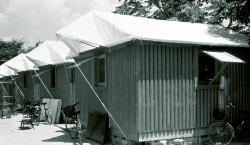Utopia Now!
California College of Arts and Crafts, San Francisco, USA
California College of Arts and Crafts, San Francisco, USA

'Utopia Now!' - the ambitious, oxymoronic title points to a change in our way of thinking, even about our own ideal imaginings. From its beginnings in the 16th century the idea of 'Utopia' - coined by Thomas More in 1516 and literally meaning 'nowhere' or 'no place' - implied a comprehensive vision of a world radically transformed in its entirety. But many of the artists and activists profiled in 'Utopia Now!' don't adhere to such a totalizing vision. Theirs is a more subversive, insurgent idealism pregnant with anarchistic urges and liberal leanings. Curator Marina McDougal's suggestion is that the process of envisioning an ideal society can itself serve as an immediate remedy for specific ills, not just hold out the promise of a destiny never to be fulfilled.
Not all the projects in this exhibition are confined to the realm of ideas; some have been employed to practical effect. Danish collective Superflex's 'Biogas Units' (1997-ongoing) are an alternative energy source fuelled by the most abundant raw material in Africa - manure. Units that transform dung into gas have been installed in several rural households in central Africa, providing the people with an independent source of power that is affordable and sustainable. Shigeru Ban's Paper Log House (1995), on the other hand, was originally designed as a temporary housing structure for the victims of Japan's devastating Kobe earthquake, but has since acquired metaphorical significance as an efficient form of shelter for displaced individuals. Made of cardboard tubes with a weather-resistant tarpaulin for a roof, the roomy Log House is an efficient do-it-yourself home that could be used by nomadic populations across the globe, from Afghan war refugees to America's urban poor.
The show's other exhibits tended to be more conceptual, however, intending to effect a change in consciousness either by telling cautionary tales or illuminating previously unforeseen alternatives. Vito Acconci's City that Rides the Garbage Dump (1999) lies at one end of this spectrum. Acconci uses irony to describe a not so distant dystopia where so much rubbish has been produced that we can no longer hide or bury it, but instead have to live on top of it. The City, as its name suggests, consists of a series of spherical bowls held aloft by the methane gas released from a garbage dump. These buoyant containers house a self-contained community, complete with farms, gardens, homes and public plazas; in short, everything that makes an ideal, self-sustaining city. But what kind of Utopia is this? Is this garbage dump as positive an ideal as we can imagine for an ambivalent future? Acconci conflates our fear of a future dystopia with a fantastical Utopia, thereby suggesting that in contemporary visions of tomorrow, the two are intrinsically linked.
Tijuana collective Torolab's installation White Noise (2001), with its techno soundtrack and streaming video of life on the border of Mexico and the United States, reveals another kind of visionary architecture. It envisions a project entitled Vertex, a pedestrian bridge straddling the border between the two nations. Vertex would house a nightclub and a gallery, offering international travellers a 'nationless' refuge where they could deposit their passports at the door and escape the rampant commercialism and surveillance pervading the border. Although the project is technically feasible, political realities militate against it.
The projects in 'Utopia Now!' may not offer long-term solutions for the world's ills, but they come together in a coherent manner to explore an imminent future transformed by humanity's increasing mobility. This world appears to be inhabited by nomadic populations that zigzag across the globe, crossing borders, partaking in a more equal distribution of natural resources, and communicating in a way that makes cross-cultural integration essential. 'Utopia Now!' successfully delineates a loosely structured, time-sensitive utopia which we might not all embrace but which some of us could probably .






















